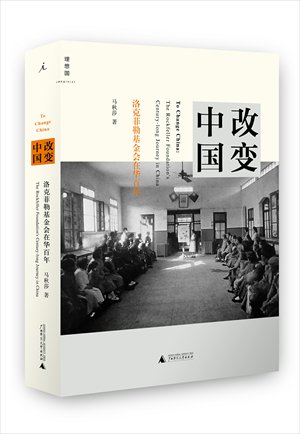Rockefeller Foundation played critical role in Chinese medical history

The concept of "traditional Chinese medicine" (TCM) that stood in opposition to Western medicine developed in the late 19th century.
Before that, Chinese doctors were open and flexible in their acceptance of Western treatments and ideas, but as Western techniques and theories outstripped Chinese ones, and cultural conflicts developed, the idea that traditional Chinese treatments were either outdated or needed to be defended developed, culminating in a division of Chinese medical practitioners into "Western" and "Chinese" medicine by the 1920s.
In her book To Change China: The Rockefeller Foundation's Century-long Journey in China, just published in Chinese, Ma Qiusha, associate professor of East Asian Studies at Oberlin College, holds that NGOs, especially the Rockefeller Foundation, contributed to this process.
The basis of Western modern philanthropy had been established, and the West was moving toward modern ideals of evidence-based medicine when the Rockefeller Foundation, endowed by billionaire John D. Rockefeller, entered China in early 20th century.
With the spreading of the missionary movements, Rockefeller became increasingly interested in China. His foundation bought the Union Medical School and renamed it the "Peking Union Medical College."
The foundation not just wanted to establish a first-class school of medicine in China. It also introduced the US Johns Hopkins model to the Peking Union Medical College Hospital, and viewed it as a laboratory of their social ideas, which reflects the foundation's ambition to change China.
In the 19th century when China faced the risk of subjugation, various forces searched for different ways to reform China and achieve modernization. Western powers also took this opportunity and tried to influence and control China's modernization. The Rockefeller Foundation's actions in China reflect this interaction between US cultural expansion and the Chinese people's own efforts.
Ma describes how the Rockefeller Foundation used its ownership of knowledge about the modernization to make its strategy toward China, and how this strategy was boycotted by China's traditional culture and intelligentsia. This process is the conflict between Chinese and Western culture in miniature.
In spite of China's long medical history, TCM eventually lost its dominant position.
The acceptance of "Western" medicine was not only because of its undoubted superiority in the treatment of many ailments, but also because some advanced Chinese intellectuals regarded criticizing TCM as an important part of overthrowing the old culture, as Ma points out.
But this doesn't mean TCM has been entirely replaced by Western medicine or that Chinese intellectuals fully accept Western culture. Chinese popular boycotts, such as the 1929 strike after the nationalists tried to abandon TCM, had a big impact on Western actions and changed their views about how to change China.
Because of history, TCM has been politicized. Medicine is merely part of the conflict between Chinese and Western culture. The spread of modern medicine in China was filled with conflicts as well as compromises, just like all other cross-cultural communications, which is skillfully traced by Ma's book.